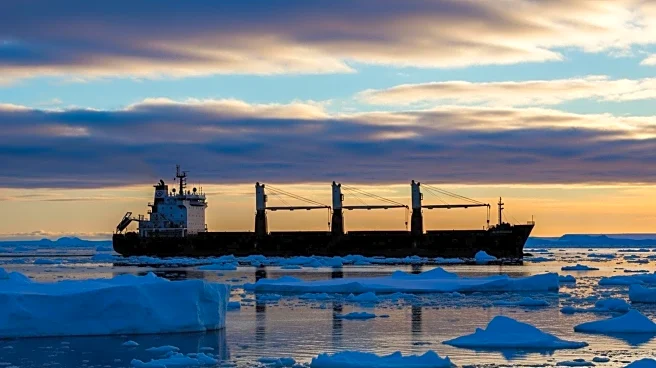What's Happening?
The freighter Thamesborg has grounded in the Franklin Strait, part of Canada's Northwest Passage, while en route from China to Quebec. The incident occurred in the southern half of the Central Canadian Archipelago, a region known for its challenging navigation due to shallow waters and ice. The grounding has raised concerns among Canadian search and rescue planners, although the operator reports no pollution and confirms the safety of the crew. The vessel is accompanied by two Canadian Coast Guard ships, including the icebreaking buoy tender Sir Wilfred Laurier. Satellite data indicates no ice in the immediate area of the grounding, despite the Northwest Passage's reputation for ice-related hazards.
Why It's Important?
The grounding of the Thamesborg highlights the ongoing navigational challenges in the Northwest Passage, a critical shipping route that is increasingly accessible due to melting ice. This incident underscores the risks associated with Arctic shipping, which can impact global trade routes and logistics. The safety of the crew and absence of pollution are positive outcomes, but the event serves as a reminder of the potential dangers in these remote waters. As Arctic ice continues to recede, more vessels may attempt this passage, necessitating enhanced safety measures and environmental protections to prevent accidents and ecological damage.
What's Next?
The immediate focus will be on safely refloating the Thamesborg and ensuring the continued safety of the crew. Canadian authorities may review and potentially update safety protocols for navigating the Northwest Passage, considering the increasing traffic and environmental changes. The incident may prompt discussions on international cooperation for Arctic navigation safety and environmental protection, as more countries and companies look to utilize this route for shipping. Long-term, the event could influence policy decisions regarding Arctic exploration and shipping regulations.
Beyond the Headlines
The grounding incident may also raise ethical and environmental concerns about increased shipping in the Arctic, a region already facing significant ecological pressures due to climate change. The potential for accidents and pollution in these fragile ecosystems could lead to calls for stricter international regulations and oversight. Additionally, the event may highlight the need for improved infrastructure and emergency response capabilities in remote Arctic areas, balancing economic interests with environmental stewardship.











